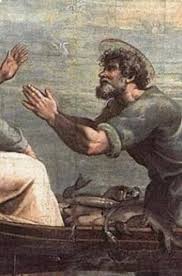A Jolt of Recognition

Dear friends,
When I told my mother I was going to church, she said, “You must be good.” “No,” I replied, “it’s the opposite. I go to church because I am bad.” I’m not sure my mother understood what I meant. For her generation, churchgoing was what good people did. You wore your good clothes - your “Sunday best” - and at church met the other good people from your neighborhood.
I recalled this brief exchange when I was listening to the gospel passage a few weeks ago, where Jesus is being pursued by crowds of followers. In order to make some distance between him and them, Jesus climbs into the boat of a fisherman called Simon. (Luke 5:1-11) After teaching the crowds from the safety of the boat, Jesus tells Simon to put out his net. Although Simon points out that they have “worked all night long but have caught nothing”, nevertheless he obeys Jesus’ command. To Simon’s astonishment, the catch of fish is so large that it threatens to capsize the boat.
If you or I were evangelists, we would probably finish the story like this: “Peter was truly amazed at the catch of fish and immediately followed Jesus.” However, that is not how the story went. Instead, we read that Peter fell to his knees and said to Jesus, "Go away from me, Lord, for I am a sinful man!”
The key word in Simon’s response is “Lord.” Simon, whom we also know as Peter, at that moment recognized who Jesus was. The clue to this instant recognition are the words Peter utters about himself, “I am a sinful man.” This is how Simon Peter knew the one who had got into his boat. His sinful nature identified Jesus.
This is consistent with an event which took place earlier, prior to Jesus getting into Simon’s boat. Jesus was healing all who were "sick with various kinds of diseases.” In Luke’s gospel we read, “Demons also came out of many, shouting, “You are the Son of God!’” (Luke 40:41) The ones who first recognize Jesus are the evil spirits, the malignant angels who enter the souls of the hapless and wreak havoc on their lives.
Although some modern readers attribute this phenomenon to a type of mental illness, the gospels are clear that this is not the case. The demons have their own voices and are used to getting their own way.
The most destructive of them all was the Gerasene demoniac, who was “always howling and bruising himself with stones.” (Mark 5) Jesus permits the demons - there were more than one - to enter a herd of swine which then stampede into a lake and drown. It’s a dramatic end to the unclean spirits, and the man previously possessed is now restored to himself. It is instructive to note that, before drowning in the lake, the demons had called out to Jesus, “What have you to do with me, Jesus, Son of the Most High God?”
I often wonder why there are not more converts to Christianity? Could it be that, rather than appealing to people’s better natures, it is the sinful, disordered nature that has the quicker understanding of who Jesus really is? It is also the reason why many, who are deeply attached to their sins, resist conversion.
When Jesus comes, the possessed and the sinful try to flee from him. Even Simon Peter, who knows himself to be unworthy, asks Jesus to go away. However, since they are both in the boat, there is nowhere for either to go, except in the water.
“I go to church because I am bad.” Those who know their own sinfulness more clearly recognize the goodness and love of Christ. Underlying all of this is the battle between good and evil. This is not a battle we can sit out on the sidelines; what is at stake is nothing less than the salvation of our own souls. Jesus is calling each one of us to acknowledge the good and evil within ourselves and commit to the good. It is easier to do this from a position of penitence than of righteousness.
“Go away from me, Lord, for I am a sinful man!” Fortunately for Simon (and, for that matter, all of us), Jesus did not go away. The sinful part of Simon was not the whole part. Jesus had work for Simon to do - both on himself and as a “fisher of men.” Later we will learn of Simon Peter’s shame as he denies Jesus three times. How extraordinary is God who forgave him that! Perhaps that is what Peter feared most of all: the boundless and generous love of God.
This is the real mystery that each of us can discover. Sin can separate us from God, but only if we let it. In identifying Jesus we risk re-identifying ourselves: not as sinners, but as sons and daughters of the most high God. When we repent and turn to Christ, we are accepting the call to become our true selves, made in the image of Christ.
Have a blessed Lent.
Father David


0 Comments
There are no comments.
Stay Tuned
Sign-up for David's newsletter